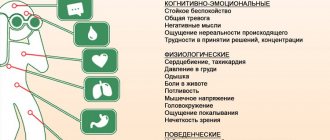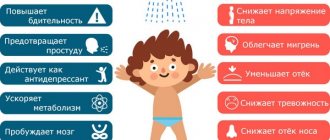Panic attack - what is it?
Some experts consider uncontrollable panic attacks to be one of the manifestations of vegetative-vascular dystonia. Others believe that it is an independent disorder. Still others see them as a consequence of stress.
All doctors' opinions ultimately come down to one thing: panic attacks are a malfunction of the autonomic nervous system, manifested by sudden anxiety, fear and accompanying physical symptoms. In a word – a vegetative crisis or exacerbation of VSD.
A panic attack, like other dystonic disorders, is not a somatic disorder. This is rather a consequence of emotional instability and the result of a functional mental disorder (not related to mental illness). That is, PA and VSD cannot be considered a disease.
The disorder predominantly affects young people aged 18 to 45 years. Women suffer from PA and VSD more often than men.
Feelings of anxiety and horror that come during an attack, as a rule, do not have a clear basis: the so-called fear of fear arises, the person does not want to experience this state again and is afraid of a repetition of the attack.
Such panic attacks are especially severe during pregnancy. After all, the woman is already worried about her new situation and worries about the baby’s health. And here you also have to worry about your health.
Against the background of panic attacks, women often develop hypochondria - a reversible mental disorder, expressed in a constant search for various diseases.
Pregnancy is a psychologically difficult period in the life of any woman, especially if it is her first. Panic attacks during pregnancy can occur in a previously absolutely healthy woman only because she cannot cope with the worries and worries associated with the health of the unborn baby, and with the responsibility that falls on her from now on.
Diagnosis and treatment
The peculiarity of VSD and panic attacks is that their symptoms often resemble a whole spectrum of individual diseases. Depending on the severity of the manifestations, they can be confused with heart disease, gastrointestinal disorders, asthma attacks, etc.
During pregnancy, it is especially important not to engage in self-diagnosis, but in case of any atypical symptoms, contact the appropriate specialists. Regardless of whether a woman has experienced panic attacks before or encountered them for the first time only after becoming pregnant, she must remember that in this condition any diagnosis and therapy must be carried out under constant medical supervision.
If a woman still does not have any obvious somatic diseases and the doctor diagnoses panic syndrome, then the first thing to do to mitigate it is to understand the root cause. Most often, attacks occur due to increased anxiety, emotional instability, and exposure to stress. This means that any treatment must begin with the awareness that fears and anxiety are to blame. Panic attacks during pregnancy can become more frequent and more pronounced precisely because the woman becomes as anxious, attentive and emotional as possible.
Moreover, any treatment of vegetative crises and relief of symptoms during pregnancy should be aimed at minimizing stress and anxiety. Mild forms of PA can be stopped and treated with breathing exercises and conscious relaxation. Drug treatment during pregnancy is contraindicated. Only in severe cases, when acute symptoms can threaten the health of the fetus, the doctor is able to prescribe mild antipsychotics, assessing the possible risk and accurately calculating the dosage.
Symptoms of panic attacks during pregnancy
The symptoms of PA attacks in pregnant women are no different from the symptoms in people in a normal state.
The severity of symptoms, their number and other characteristics depend on the specific individual: general health, type of nervous system, mental state, character traits.
The most common symptoms of panic attacks during pregnancy are:
- Lack of air, chest pressure, shortness of breath.
- Dizziness.
- Tachycardia (rapid heartbeat).
- Pain in the heart, chest.
- Darkening in the eyes, spots, blurred vision.
- Numbness of the limbs.
- Weakness in legs, arms.
- Trembling in the body, feeling of goosebumps.
- Increased sweating.
- Chills or, conversely, a flush of heat.
- Pain in the body, muscles.
- Changes in blood pressure.
- Noise, ringing in the ears.
- Compression of the temples.
- Tingling, muscle twitching.
- Nausea (rarely vomiting).
- Gastrointestinal disorder.
- Frequent urination.
- General weakness, malaise.
- Unreasonable fear, anxiety, strong fear of death.
The average duration of an attack is 15-25 minutes. PA can be mild or very severe. After an attack, increased fatigue, instability of mood and self-control, and sleep disturbances usually appear. A person does not have the strength for an intellectual or physical robot.
Sometimes panic attacks in pregnant women occur without a feeling of fear. But a suffering woman experiences depression, apathy, a feeling of melancholy, or, conversely, irritation that develops into aggression. Some develop agoraphobia (fear of open spaces). With agoraphobia, people cannot be in a store, the subway, leave the house, or be alone. It is a frequent companion of VSD and panic disorders.
How to behave during a seizure
In pregnant women, panic attacks should be quickly eliminated. It is easier to deal with the physiological manifestations of seizures. To do this, you need to learn to achieve a state of relaxation. Training involves doing exercises to tense and relax certain muscle groups, then you need to tense the whole body.
You need to repeat the exercise of increased tension and relaxation while taking a deep breath. To this end, to quickly combat a seizure, you need to master breathing exercises and other procedures that help relieve stress.
Causes of panic attacks in pregnant women
There are many factors that provoke the development of panic attacks during pregnancy.
The most common reasons include:
- Anxious and suspicious personality type. Such people are impressionable, emotional, they exhibit excessive anxiety and self-doubt.
- Previous strokes, tumors and brain injuries.
- Diseases of the reproductive system, thyroid gland, adrenal glands (endocrine system as a whole).
- Various psycho-emotional tensions, stress, neuroses, psychological trauma, physical and mental stress.
- Chronic lack of sleep.
- Lack of certain vitamins and elements in the body.
- Hereditary predisposition.
- Hormonal changes during adolescence, the establishment of the menstrual cycle, pregnancy, menopause.
If a woman did not previously have PA, but during pregnancy they suddenly appeared, the reason most likely lies in pathologies of the endocrine system. Diseases of the thyroid gland or adrenal glands are often asymptomatic. But it is the endocrine system that produces all the main hormones responsible for the regulation of the autonomic system.
During pregnancy, many women experience hypothyroidism (thyroid deficiency). With this disease, the adrenal glands produce increased amounts of adrenaline. Adrenaline surges provoke panic attacks.
Therefore, in case of PA, it is necessary to undergo a thorough medical examination and pay special attention to the organs of the endocrine system.
Essence of PA
Sometimes you can hear complaints about numbness in some parts of the body, a feeling of “pins and needles”, trembling. Such patients also quite often complain of poor sleep and appetite, constant weakness, i.e. they have symptoms of depression.
They may experience attacks of acute fear, which are accompanied by increased heart rate, a feeling of suffocation, and nausea. This all happens suddenly, without any external reason, which, of course, frightens the patient. After this, the person is afraid of losing control over himself, over the situation, and other fears develop - madness or death, etc. These, in fact, are panic attacks (PA).
Usually, during examination, these patients do not reveal significant disturbances in the functioning of the body. Accordingly, panic attacks are not life-threatening, and their symptoms are symptoms of a psychological disorder.
The term “panic attacks” began to be used by domestic doctors not so long ago. Previously, such disorders were called VSD, vegetative crisis, cardioneurosis, sympathoadrenal crisis or neurocircular dystonia. These names are still used today, but in international practice the terms “panic attacks” and “panic disorders” are still used.
Panic attacks can vary in severity.
The duration of light PA is 10-15 minutes. Usually only one symptom appears, for example, pain in the stomach area or headache. A person may not attach any importance to such an attack at all. After it, no consequences are felt.
With a moderate attack (its duration is 15-60 minutes), the symptoms are pronounced, followed by instability of self-control and mood, increased fatigue, sleep disturbance, and lack of strength for physical or intellectual work. The duration of such consequences is up to one and a half days.
Severe attacks (their duration is over an hour) are accompanied by a number of symptoms, but with increased intensity, up to the occurrence of convulsions. Afterwards, the same consequences take place as with a moderate attack, but the person feels them for several days.
It should be kept in mind that panic attacks are not necessarily a consequence of a panic disorder. The reason may lie in depression, taking certain medications, endocrinological diseases, phobias, etc.
Panic attacks and VSD crises during pregnancy - is there a danger?
During pregnancy, the situation is complicated by the fact that a woman usually becomes more suspicious and anxious, listening to her condition and constantly assessing the potential danger around her. Against this background, attacks of PA may become more frequent and severe.
Sometimes during pregnancy, a woman experiences attacks of anxiety or fear for the first time, and this situation is doubly unpleasant for her: in addition to the painful sensations, there is a logical fear for the health of the unborn child.
During this period, many women experience frequent mood swings. This contributes to an increase in the number of different phobias and fears, which can provoke the appearance of PA. The greatest fear that most expectant mothers have is the loss of a child. It is capable of transformation into various forms at different stages of pregnancy: fear of miscarriage or frozen pregnancy (1st trimester). Then it can transform into fear of interruption for medical reasons (2nd trimester). Fear of premature birth (3rd trimester).
Online appointment with a doctor in any city in Russia
Next comes fear for the child’s condition. A woman experiences anxiety so that her illness or condition does not affect the child’s health in the future.
In third place are worries about whether the expectant mother will be able to provide the child with everything she needs, and fear for the future of this child.
Interesting facts about pregnancy:
Fact 1
Tuesday is a popular day for children to be born. Scientists studied the dynamics of child birth and found that most children are born on Tuesday. The fewest children are born on Saturday or Sunday.
Fact 2
Do you know why more than 90% of all babies are born with blue eyes? All this is explained by the fact that at the time of birth, children lack melanin, which accumulates in the iris of the eyes only from six months.
Fact 3
The child begins to show emotions even in the womb - laugh, cry, be sad. Moreover, the crying of a child in the womb is not always caused by the mental state of the baby; it is simply in this way that the baby prepares himself for the difficult process of childbirth.
Symptoms of PA
The existing symptoms are divided into 2 groups: emotional and vegetative (manifestations of dysfunction of internal organs).
The following vegetative symptoms of PA can be distinguished:
- respiratory (difficulty breathing, lack of air, suffocation, shortness of breath);
- disturbances of vestibular and gastrointestinal functions (uncertain gait, dizziness, diarrhea or constipation, dry mouth, stomach pain, nausea, vomiting, digestive disorders, etc.);
- disturbances in sweating and thermoregulation (increase or decrease in temperature);
- cardiac (irregular heart rhythm, decrease or increase in blood pressure, rapid heartbeat).
As for emotional symptoms, there are quite a lot of them. The most characteristic of them is a feeling of unreasonable fear, which often turns into panic. In some cases, it has a certain form - a person is afraid of going crazy, disgracing himself in front of others, getting sick, etc. Sometimes attacks can occur without a feeling of fear, but the patient experiences melancholy, depression, or, conversely, irritation that develops into aggression. Some may develop a fear of open spaces (agoraphobia); others cannot be in the subway, a store, be alone, or leave the house.
With atypical panic disorders, patients complain of various pains - headache, in the spine, stomach, feeling of a lump in the throat, fever, problems with speech and voice, vomiting, muscle tension, weakness in the legs or arms.
Against the backdrop of such symptoms, depressive disorders develop – social anxiety decreases. activity, interest in the environment disappears, the patient constantly feels weak, tired, his appetite disappears, sleep disturbance occurs, and sexual problems appear.
Doctors distinguish several types of PA, each of which has its own specific symptoms.
Manifestation of a vagoinsular attack is a feeling of lack of air, dizziness, nausea. A person experiences a drop in blood pressure, pulse rate, body temperature, and sweats. Sometimes problems with the gastrointestinal tract appear - flatulence, abdominal pain, rumbling, etc. An increase in attacks occurs due to anxiety, overwork or stress. Afterwards, the patient feels unwell, weak, and exhausted for several days.
A sympathoadrenal attack is characterized by increased heartbeat, headache or pain in the heart area, increased body temperature, blood pressure, and pulse. The person is chilling, his face turns pale or red. There are attacks of fear for no reason. Afterwards, excessive urination is observed, which is due to increased work of the kidneys with increased pressure.
Panic attacks during pregnancy - impact on the fetus
Panic attacks and pregnancy are not mutually exclusive. These manifestations cannot be considered a direct contraindication to conception and childbirth, since they are not dangerous in themselves.
But attacks can complicate the course of pregnancy, since the condition of the mother directly affects the condition of the fetus. For example, a sharp drop in blood pressure is manifested by a lack of oxygen in the blood, and the release of stress hormones leads to muscle overstrain. Hypertonicity of the uterus, which inevitably occurs with muscle tension, in severe cases increases the risk of miscarriage.
A child in the womb always feels the state of its mother. Scientists have proven that a neurotic type of character can begin to form during the period of fetal development. The mother passes on her neurotic reactions, behaviors and reflexes to the child.
Therefore, although panic attacks are not a serious threat to a child’s health, there is still a negative impact.
Doctor's opinion
Elena Kim, obstetrician-gynecologist:
“I have met patients suffering from panic attacks. If the disorder is not caused by a disease, it is possible to correct the psycho-emotional state of the pregnant woman with the help of psychotherapy, which I always recommend to such women. I resort to medications last.
In diseases such as hypothyroidism, attacks usually stop on their own after appropriate treatment. It is very important to carefully diagnose the patient and detect the cause of panic attacks in time.
Pregnancy in such women occurs differently. It all depends on the general level of health, age, number of births. But in most cases, pregnancy proceeds well and the child is born healthy.”
Valerian for panic attacks and VSD, how to take
Additional methods in complex treatment
To distract from anxious thoughts and reduce the frequency of panic attacks, experts recommend treatment methods such as:
- acupuncture (acupuncture);
- light therapy (a healing technique that involves exposing the body to light waves);
- art therapy (creative activities);
- aromatherapy (impact on the body using odors);
- infrared radiation (healing electromagnetic radiation);
- herbal medicine (treatment using medicinal plants).
What to do if you have panic attacks during pregnancy
There is no cure for panic attacks; they are not treated with medication. To get rid of PA, it is necessary to influence the cause, and not the effect, which are crises. There are medications that relieve panic attacks, but many of them are contraindicated during pregnancy.
Any medications, even the most harmless ones, should be prescribed by a doctor to a woman expecting a baby.
Relaxing techniques will help you get rid of panic attacks on your own or reduce the frequency of their occurrence.
Breathing exercises from PA for pregnant women
A panic attack changes the physiology of the body through the psyche. If the patient is unable to cope with his body, his muscles tense, his heart rate fluctuates, and his breathing is interrupted. This entails an even more pronounced attack of fear. In this case, the main goal for stopping an attack is to equalize breathing, which, in turn, will help to relax the body.
When choking, attempts to breathe often only aggravate the situation and increase tension. Accordingly, in order to relax, you need to focus on exhaling. The essence of relaxation breathing exercises is to increase the time allotted for exhalation.
To control the time, conditionally divide the breathing process into 3 phases: inhalation, pause and exhalation. Start with five seconds inhaling, four seconds pausing, and five seconds exhaling.
In each new cycle, subtract one second from the pause and add one second as you exhale. After 4 cycles, the duration of exhalation will reach 10 seconds. Breathe in this rhythm for a couple of minutes, and you yourself will feel how the tension goes away and the attack subsides.
Autogenic training and meditation give good results. If desired, any woman can master these techniques. Meditation is very useful during pregnancy and is an excellent remedy for panic attacks.
This is also interesting:
How dangerous is VSD to life and what outcome can it lead to?
Conclusion
Today, PA has many different names - vegetative crisis, VSD with a crisis course, cardioneurosis, which are used in modern medicine. But no matter what the disease is called, a pregnant woman will still be subjected to excruciating fear and anxiety states that she cannot overcome on her own.
The right decision in this case would be to contact a specialist (psychologist or psychotherapist) and perform a set of breathing exercises, because just a few minutes of breathing exercises will help relieve tension and, if they do not prevent panic completely, will soften it.
Every pregnant woman undergoing PA should receive only positive emotions, engage in her favorite hobby, and think less about various dangers and complications. This will help not only the mother to avoid seizures, but also your baby to be born strong and healthy.
- Causes and treatment of sleep paralysis
- Panic attacks after drinking alcohol
- Features of treating panic attacks with folk remedies
Planning pregnancy during panic attacks
VSD and PA are not a contraindication to pregnancy. But a woman with such disorders needs to plan conception in advance by completing a rehabilitation course and following the doctor’s instructions.
Doctors recommend completely stopping taking psychotropic medications at least 2 months before conception. Taking psychotropic drugs during pregnancy in the first trimester is strictly prohibited.
In the second and third trimesters, they can be prescribed only in critical cases: if the benefits to the mother outweigh the risks to the fetus (that is, only in situations where the mother develops too severe a mental disorder, and medications cannot be avoided).
Tranquilizers, antidepressants and some sedatives used during pregnancy can put the fetus at risk of developing various birth defects. Under no circumstances should they be taken on their own.
When planning a pregnancy, it is recommended to undergo a course of drug treatment in advance. Even before conception, it will be useful to use non-drug methods (psychotherapy, breathing practices, relaxation techniques) and adherence to a certain regime.
Specialists who provide assistance with panic attacks: psychiatrist, psychotherapist (sometimes psychologist), neurologist. A psychiatrist mainly provides only medication assistance to the patient, so it is better to entrust panic attacks in pregnant women to a psychotherapist (after all, the choice of medications approved for pregnant women is very small).
If pregnancy is planned in advance, you have time to gently and gradually stop taking medications and switch completely to non-drug safe means of self-help and rehabilitation.
The likelihood of a miscarriage
Panic attacks are a common occurrence in pregnant women and are not serious. Panic attacks can cause muscle tension. This ultimately causes uterine hypertonicity.
Therefore, you need to try to monitor your own mental state. This can be dangerous for the healthy development of the fetus.
During pregnancy, girls worry about the condition of their children. This is a normal reaction. Sometimes during pregnancy a state of anxiety occurs. The palms become cold and sweaty, breathing is interrupted. Such conditions can be described as panic attacks. At such moments, it is difficult for expectant mothers to concentrate and think logically.
Prevention
Panic attacks are not a contraindication for conception and birth of a baby. To reduce their manifestation or completely avoid attacks, it is necessary to carry out a number of preventive measures.
- Follow the regime, get tired less, rest for the required amount of time.
- Perform light physical exercises and spend more time outdoors.
- Completely give up bad habits (smoking, drinking alcohol), and also reduce coffee consumption to a minimum.
- To reduce the feeling of fear before childbirth, relax more, this is a great help in dealing with stress.
- It is recommended to drink plenty of water, eat fresh fruits and vegetables, and reduce sugar and salt intake.
- Before going to bed, it is advisable to drink soothing herbal infusions.
An excellent method of preventing attacks is to visit a qualified psychotherapist before and after the birth of your baby.










